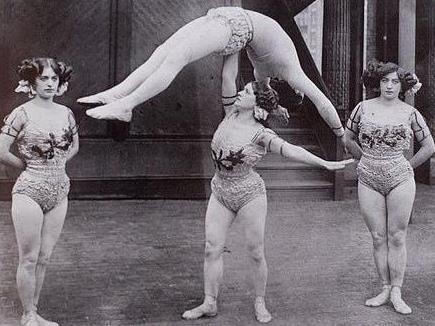It’s no coincidence that Circus Oz chose to make strong women the focus of its recent fundraising event. The Circus has distinguished itself by re-imagining the role of women under the Big Top.
Mel Fyfe, former Circus Oz ensemble performer and current company manager, said during her years as a performer she was fortunate to be nurtured by circus companies, particularly Circus Oz, that didn’t assign roles along gender lines.
But she said that attitude remains the exception in circus arts.
‘ I still see it all the time in circus. You see the girls doing the pretty aerial tissue act or the trapeze act where the boys are on the bottom with the girls standing on top of them and as beautiful and gorgeous as that is let’s not make that stereotypical circus.’
While the expectations are slowly changing, Fyfe said when Circus Oz needs to cast strong women in the show it is still choosing from a pool that is ‘not that large’.
But when women move from the traditional roles, their capacities always impress Fyfe. ‘To get a group of woman in a room doing a strong woman master class, encouraging each other, empowering each other, discovering more about what they can do – it’s such an incredible thing to watch…’
Fyfe was part of a panel strong women discussing he qualities that can propel women into positions of strength for Circus Oz. Also on the panel were businesswomen and Circus Oz Chair Wendy McCarthy, former Governor-General Dame Quentin Bryce and Professor Denise Bradley.
The money raised by the event will be directed to the Circus Oz Strong Women program, a professional development training and master class program for both aspiring company performers and independent artists. It recently ran a pilot program, with special assistance from the Australia Council and individual donors, for seven female circus artists from across Australia.
From their very different, fields, the women identified common secrets of strength and named some inspirational role models who demonstrate these qualities.
- Resilience
None of the women on the panel rose to success without a willingness to bounce back after setbacks. It’s a theme that emerges in all walks of life. McCarthy gave the example of US Presidential candidate – and famously long-suffering wife – Hilary Clinton.
‘Hilary Clinton probably demonstrates more than anything else to me the power of resilience. It has come at her from every direction,’ she said. - Willingness to take risks
McCarthy said until relatively recently young women were not encouraged to take risks, blocking out their child-bearing years from key opportunities that shape their futures.
‘You are protecting that part of your life where you might have a child so there may be a period of 20 or 20 years where you are risk averse,’ she said. ‘It just frames a lot of your thinking.’
Now if a young woman asks her whether she should take an opportunity in life, she tells them to say yes. ‘Because when you land you never know where you’ll land and you will find out very easily that most of the people around you don’t know any more than you so you can afford to take a risk.’
The same is true at the other end of life. Clinton is 68 and putting herself forward for the presidency. - Toughness, tempered with compassion
You need a tough shell to bear the slings and arrows of a successful life – but it can’t be at the cost of empathy.Bradley singled out German chancellor Angela Merkel for both her tenacity and pragmatism.
‘She’s incredibly tough. There’s no doubt about that. She’s also compassionate. It seems to me that she absolutely marches to the beat of her own drum. She has very little interest in meeting conventional notions of what women should be, should look like and should behave like.’
Although Bradley said she doesn’t necessarily agree with everything Merkel has done, she admires her ability to deftly tread the line between being uncompromising and being pragmatic.‘She is somebody who has that mix of principle and pragmatism which enables her to deal with issues as they come up; take a position; and then argue them through and hang in there until she gets what she thinks is the right outcome. I think that’s incredibly important if you’re wanting to be successful in any walk of life…’
- The drive to make a difference
Bryce pointed to Dr Catherine Hamlin’s impact on hundreds of women suffering from fistula injuries through the School of Midwifery she and her husband set up in Ethiopia, highlighting her ‘professional skill and tenderness and great faith and strength’.
‘She came to mind very easily when I was asked about strong women.’
McCarthy pointed to June Oscar, an Aboriginal woman from Fitzroy Crossing, who has been willing to speak out about the prevalence of FASD (foetal alcohol spectrum disorder) in the community. ‘She’s now establishing research and support with Sydney University and some of those kids will have a chance of a life but to be in a small community and indigenous community is not very female-friendly she is truly one of the most significant leaders in this country…’
- Spirit and charisma
Spirit and charisma are the two qualities that made Maddy Bartlett stand out to Bryce when she met the school-girl in the aftermath of the Victorian bushfires in 2009. ‘She lost everything – her family, her friends, her school. She spent long, long months in hospital many times. I’ve never heard her complain,’ said Bryce, adding that she has kept in touch with her. ‘I always say she’s the person with the most spirit that I’ve ever met. Now she’s a pilot. She’s just done her first solo flight.’
For those responsible for creating a culture that nurtures strong women, Bryce said it takes a commitment to providing young women with practical ‘support and encouragement; opening doorways and making connections.’
McCarthy said backing other women was crucial, agreeing with Madeleine Albright’s assertion that ‘there’s a special place in hell for those of us who don’t support other women.’
She acknowledged, too, that it could be ‘extremely wounding’ for female leaders or strong women to be attacked for being ‘butch’, a ‘ball-breaker’ or overly masculine, particularly in the years where they might be looking for a partner. ‘I don’t think you should underestimate it. We just have to learn to manage it.’
Bradley said changing structural barriers in things like law and the public service are still ‘terribly important’, pointing to the childcare debate.
She also highlighted the ‘huge gap’ between women’s achievement in education and their achievement in business. More than 65 per cent of undergraduates are women and the bulk of graduation prizes are awarded to women. ‘Where do they go to when they go to work; what is happening?’





